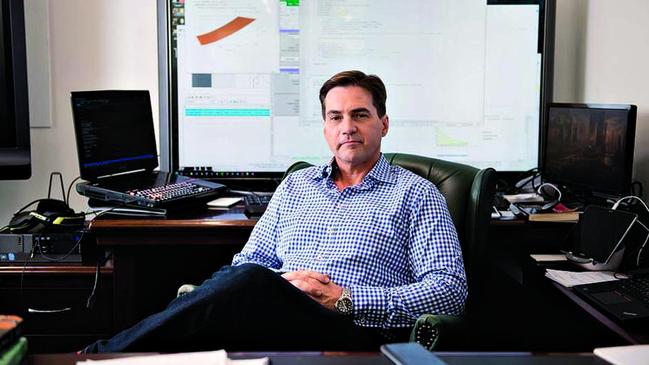Bitcoin is now a Ponzi scheme, says Craig Wright, the man who claims to have invented it
The man who claims to have invented the digital currency says it was meant to be the successor to cash, not a tool of speculation.

The price of bitcoin hit $48,192.14 when Elon Musk’s Tesla said it had spent $1.5 billion on the digital currency and would soon accept it as a form of payment for its electric cars.
At home in Surrey, Craig Wright sighed. “I went from stupidly rich to insanely rich. Technically, my family is one of the richest in the world now because of insanity.”
Wright, a 50-year-old computer scientist from Australia, and his family are the beneficiary of trusts that purportedly hold up to 1.1 million bitcoin. Based on last week’s high of $47,909.33 — bitcoin was boosted again when Bank of New York Mellon said it would start accepting it, and JP Morgan said it would trade it — the trove is worth nearly $53 billion.
How did anyone amass the world’s biggest bitcoin stockpile? By creating it. Wright claims he is Satoshi Nakamoto, the digital currency’s mysterious founder and author of the October 31, 2008 paper laying out the vision for “a purely peer-to-peer version of electronic cash”.
Many dispute Wright’s claim. He has never offered definitive proof. A UK court has ruled that he can sue a Norwegian man who called him a “fraud” on Twitter. “A lot of people don’t want me to be Satoshi,” said Wright. “It’s that simple.”
He was certainly heavily involved in the early days of bitcoin, and he is aghast at what it has become: “gold 2.0”, a speculative investment with little real-world utility. “Digital gold is boring. The [paper’s] first section talks about micro payments, which were the holy grail.”
For Wright, they still are. Through nChain, the London-based company that encompasses his research, he hopes to deliver on that original promise. “My vision remains digital cash,” he said. He is developing other ways to use bitcoin and the digital ledger “blockchain” technology that underlies it, from tracking opiates to door-to-door seafood monitoring.
“If I had my way, people would be completely bored with everything to do with bitcoin, because it would be plumbing,” said Wright.

The supposed Nakamoto trove is the subject of a court case. David Kleiman, a Florida man whom Wright referred to in emails as his best friend and business partner, died in 2013. Kleiman’s brother, Ira, is suing Wright, claiming his brother’s estate is owed up to half of the bitcoin thought to be held in trusts. In an email produced for the case, Wright wrote: “I had an idea, but it would never have [been] executed without Dave.”
How much the trusts may hold is not clear. Wright told Australian tax authorities who were investigating his affairs in 2015 that he and Kleiman had “mined”, or created, 1.1 million bitcoin. This aligns with the amount from the early days that has not been moved. Many, if not all, of those coins are broadly attributed to Satoshi Nakamoto. The trial will begin in June after an attempt at mediation failed.
It is a strange case. Kleiman’s claim is predicated on Wright being Nakamoto, which has not been proven, and concerns rights to bitcoin that Wright has not verified that he controls.
There was a time when the identity of Satoshi Nakamoto was a white whale. People wanted to know who the genius behind bitcoin was. Wright outed himself in 2016 to The Economist, GQ and the BBC, claiming on camera: “I was the main part of it, but other people helped me.”

Yet the “proof” he provided - signing a message using a private key only Nakamoto would have - was cut and pasted from a publicly available signature. He was pilloried. In a preliminary hearing for the Kleiman case, the judge slammed Wright for providing forged evidence and perjuring himself.
Wright, who has Asperger’s syndrome, appears both desperate for recognition and annoyed at the public’s refusal to grant it: “People are weird.”
He is intellectually arrogant, claiming “I don’t even know how many degrees I have”, then reeling off no fewer than seven he is taking via correspondence. “By the time I finish, I’ll have more patents than Edison and Tesla combined ... All these people think they can stop my legacy. It will be there anyway.”
Wright has backers. In 2017, nChain was bought by a private equity vehicle managed by Liechtenstein-based Accuro Fund Solutions. Accuro did not respond to emailed questions. However, with each wild price rise the split widens between originalists such as Wright - who want blockchain to become the rails on which everything rides, from the internet itself to banking and supply chains — and the digital gold crowd. In 2010, Laszlo Hanyecz, a software developer, spent 10,000 bitcoin — then worth fractions of a cent each — on two pizzas. They would be worth $470 million today.
Hanyecz’s expensive meal neatly sums up how far bitcoin has travelled. “Often the inventor of a technology has a vision in mind, and it gets pivoted and taken in another direction by other creative entrepreneurs who have a different vision,” said Bart Stephens, founder of venture firm Blockchain Capital.
“People do not want to spend bitcoin on goods and services because everyone that has spent bitcoin, including me, has repented ... Nobody wants to be that kid who spent 10,000 on two pizzas.”
Wright likened bitcoin’s rise to a Ponzi scheme: “The price goes up because people are paying and the price goes up. But that doesn’t ever last for ever. Old Charles Ponzi did that one too. And Mr Madoff ... Eventually, people go, ‘But what are we using it for?’ And then coins go down.”



To join the conversation, please log in. Don't have an account? Register
Join the conversation, you are commenting as Logout